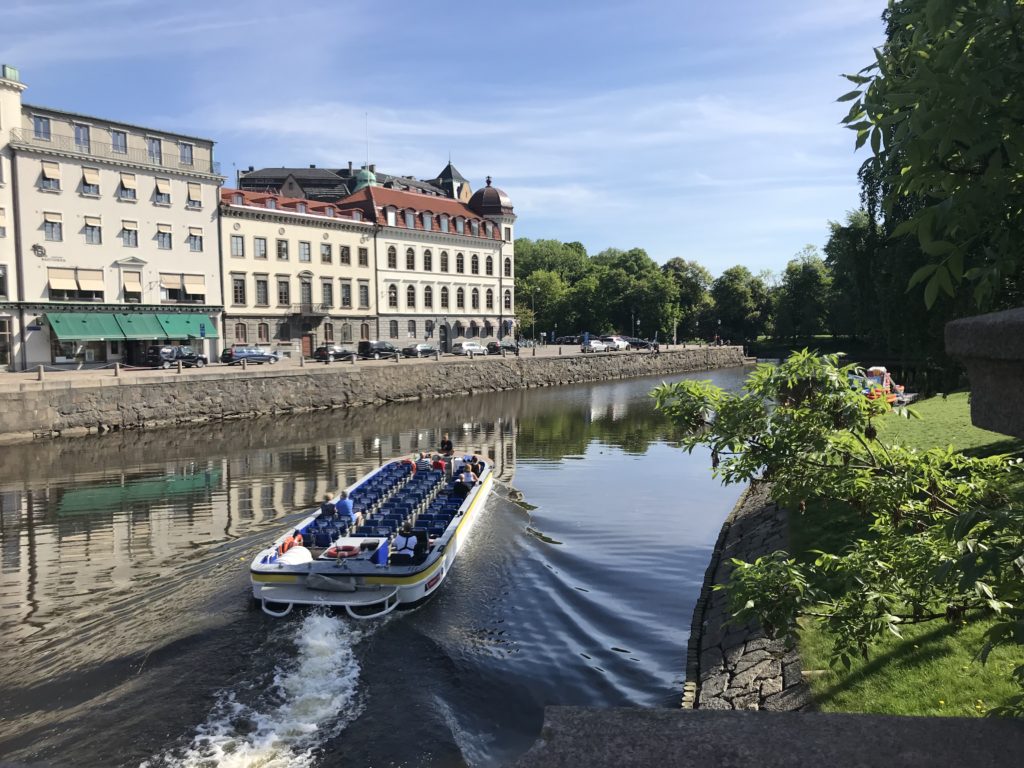
By: Katey Duffy
Imagine living in a community with solar panels and wind turbines attached to every rooftop, vertical urban farms growing produce indoors without pesticides and harmful pollutants, smart lighting that brightens depending on the time of day and censored movement or self-driving cars that can discover open parking in your city.[1] This may sound like a city of the future, but these smart cities are already being developed all over the world in cities like Barcelona and Stockholm.[2] Using the Internet of Things (“IoT”) to gather and analyze data, smart cities are urban areas focused on generating economic development in ways that promote sustainable living.[3] Smart cities are the way of the future but intellectual property licensing may allow these pilot programs to expand exponentially and maintain protection throughout this revolution.
Smart cities are designed using innovative big data technology, and many smart cities have been popping up in environmental-focused communities.[4] The advancement of technology has allowed these cities to incorporate information about human behavior in ways that will create both social and environmental benefits to all citizens at reduced costs.[5] Although these smart cities are helping people live more sustainable lives, there are certain intellectual property issues arising related to the creative protection of these city designs.[6] Companies are forming research and development (“R&D”) projects to pilot smart cities in different metropolitan centers, but city designers are trying to find the perfect balance between allowing their creations to help reduce our carbon footprint while also being compensated for their time and effort in generating these groundbreaking technology-based communities.[7]
The legal issue becomes how to protect these smart city designs and intellectual property licensing may be the solution.[8] The biggest legal hurdle related to protecting smart cities is the difficulty in trying to sue the IoT because it is a widely distributed network.[9] The best way to overcome this obstacle would be to license smart city designs and data compilations. Licensing seems to be an important way to balance the need for more sustainable cities while still crediting the “author” of the designed city.[10] Due to data ownership and privacy issues, licensing smart city designs may be the most useful way strike a balance between protection and innovation.[11] Additionally, without licenses, there may be barriers for firms to participate in the development of smart cities.[12]
Licensing seems to be the best option because other intellectual property protections do not align completely with the goal of using technology to design sustainable smart cities to better our society. Patents may assist in protecting the designer which increase a business’s competitiveness, but may ultimately contradict the goal of creating cities that are collectively trying to solve environmental problems.[13] Trademark law may play a role in differentiating among different smart cities but this intellectual property protection is viewed through a consumer lens.[14] Trade secrets may be useful in protecting the city design, but feasibly a company may have a difficult time trying to keep the city design a secret when many community members will be living in the smart city and accessing information related to how the city operates on a day-to-day basis.[15] Although patents, trademarks, and trade secrets may be considered by city developers, they may avoid lawsuits by entering agreements for overall protection.[16]
With the creation of more smart cities in the future, intellectual property licensing agreements will help dictate how companies, who are the first-movers in this new market, protect its ideas moving forward. The IoT allows the compilation of enormous amounts of data which can be analyzed in a way to better our society by learning human behaviors and tendencies and conserving community resources.[17] Companies using the IoT to learn this information and build cities that promote sustainability and social welfare should be rewarded for their contributions through intellectual property law. Business topics like transparency, accountability and privacy are at the forefront of this arising legal issue[18]and licensing is a fair way to allow more smart cities to develop while protecting the rights of these pioneering designers.
1 An Inside Look at Smart Cities, Bank of America Merrill Lynch(last visited Feb. 10, 2019), https://www.bofaml.com/en-us/content/smart-cities/the-smart-city-opportunity.html?md=7.
[2]Silver Spring expands IoT in Stockholm, Smart Cities World(Sept. 22, 2016), https://www.smartcitiesworld.net/news/news/silver-spring-expands-iot-in-stockholm-951.
[3]Smart Cities Services Worth $225bn by 2026, Smart Cities World(Apr. 26, 2017), https://www.smartcitiesworld.net/news/news/smart-cities-services-worth-225bn-by-2026-1618 (describing the IoT as the interconnection of computing devices linked to everyday object using the internet).
[4]Id.(defining big data as the analysis and computation of large data sets to reveal trends and patterns related to human behavior and interactions).
[5]Id.
[6]Kenie Ho, Internet of Things Patents: Tough to Enforce?,Finnegan(Nov. 7, 2016), https://www.finnegan.com/en/insights/internet-of-things-patents-tough-to-enforce.html.
[7]Jonathan Andrews & Richard Forster, Should Cities License Their Own Intellectual Property?, Cities Today(Nov. 4, 2016), https://cities-today.com/the-new-breed-of-cio/.
[8]Ho, supranote 6.
[9]Id.
[10]Andrews & Forster, supra note 7.
[11]Teresa Scassa, Smart Cities: Data Ownership and Privacy Issues, Teresa Scassa(Feb. 14, 2017), https://www.teresascassa.ca/index.php?option=com_k2&view=item&id=241:smart-cities-data-ownership-and-privacy-issues&Itemid=81.
[12]Bianca Wylie, Sidewalk Toronto – Intellectual Property, Innovation, and the Politics of Choice, Medium (Sept. 1, 2018), https://medium.com/@biancawylie/sidewalk-toronto-intellectual-property-innovation-and-the-politics-of-choice-8e795e67aaef.
[13]Helika Jurgenson, Intellectual Property Rights Protection for EU SMEs related to Smart City Solutions, Your IP Insider (Dec. 4, 2017),
https://www.youripinsider.eu/intellectual-property-rights-protection-eu-smes-related-smart-city-solutions/ (explaining how gaining patents on these smart city designs would deter other cities from creating and implementing similar plans in fear of violating existing patents).
[14]Id.(expressing that trademarks would signify the company that designed the city but would not offer much protection related to the designs which are generally more protectable under patent law).
[15]Id.
[16]Smart Cities Services Worth $225bn by 2026, Smart Cities World(Apr. 26, 2017), https://www.smartcitiesworld.net/news/news/smart-cities-services-worth-225bn-by-2026-1618.
[17]Id.
[18]Scassa, supranote 11, at 2.

